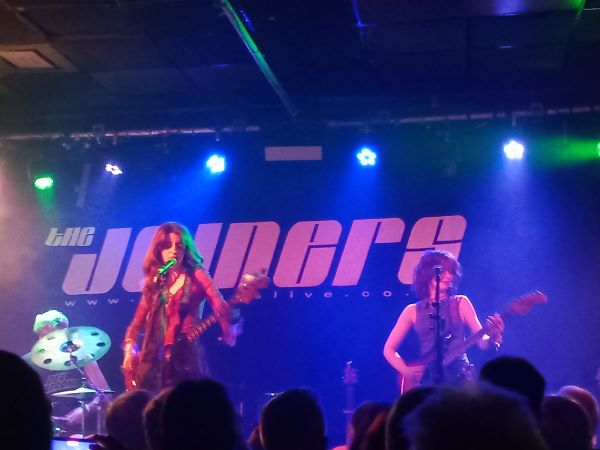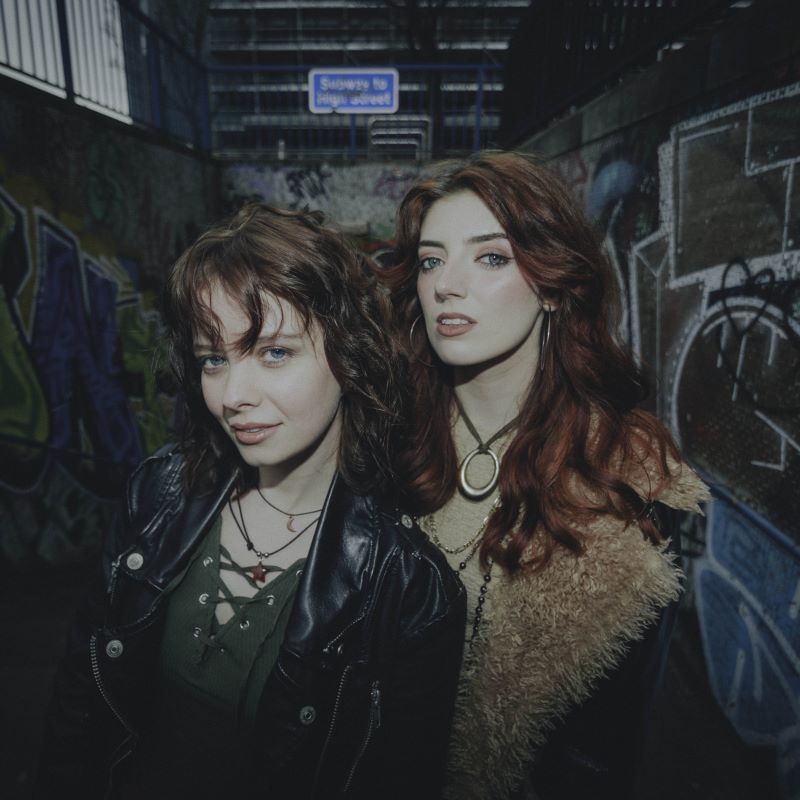By Vicky Greer.
Fresh from the release of their self-produced debut album For Your Sins, Dea Matrona are in a back room upstairs at The Joiners, getting ready to play their first headline show in Southampton. Tomorrow will be their first day off in 10 days amidst a hectic tour, but tonight they’ll be bringing their old-school rock and roll to the city. I caught up with the duo, Orláith Forsythe and Mollie McGinn to talk about Ireland’s booming music scene and their journey so far, from busking on the streets of Belfast to headlining gigs across the UK.
A few years ago, Dublin was the centre of Ireland’s blossoming musical scene, but these days all eyes are on the North, with bands like Cherym, Problem Patterns and KNEECAP capturing attention. So what was that environment like for Dea Matrona to come up through as a band?
“It kept us on our toes because there was so much good music, like you say. We always just felt so encouraged by everybody in the scene, we still do,” explains Orláith. “It’s all very, very supportive. I just think the Belfast and the Irish scene in general is thriving at the minute. There’s so much talent. And it’s really inspiring just to see people around you doing amazing things.”

She describes busking in Belfast as “the toughest gig, but the best gig. It toughens you up.”
Mollie elaborates: “There would be videos of us busking posted online and we would watch them back, all excited. And then it would be like, ‘They’re f*ckin’ out of tune,’ or something’.”
“But it did help us learn to play for an audience,” Orláith adds.
Neither one has been put off by the occasional blunt Belfast reaction (which, as a fellow Northern Irish person, I can verify), declaring that they would love to go back to busking in the future.
Along with the growing music scene, Belfast is also becoming a hub for film and TV, and Dea Matrona’s cameo in police drama Blue Lights saw these two worlds come together.
Orláith shares how the appearance came about: “The music supervisor for Blue Lights likes our band and has supported us for quite a few years. She phoned us one day and said ‘I really, really want you to be in the very end scene of Blue Lights,’ And we were like, ‘Oh my God, yes.’”
It was a big moment for the duo, who were already fans of the show. “It was a really mad scene to be in because the whole cast is in it,” says Mollie.
For Your Sins is a polished first outing, reminiscent of legends like Fleetwood Mac and The Cranberries with the duo’s modern twist and stunning harmonies as they span rock and country genres over the 12 songs on the album. Most impressively, the album is entirely self-produced and released independently on their own label. A bold, but increasingly common, move for a new band.

“We’ve had a few label offers. We didn’t go with them because it wasn’t really our vibe right now,” says Orláith. “So, we produced the album ourselves and wrote it and yeah, we just decided we wanted to stay independent.”
Some of the influences behind the record are obvious, like Fleetwood Mac, Led Zeppelin and other bands that fall under what they call the “dad-rock” umbrella, a genre that Orláith and Mollie bonded over while at school. Others are less apparent.
When we were doing the album cover, we were inspired by Friends. We were inspired by The Craft, kind of fashion vibe because when we were doing our music videos we were trying to go for that kind of movie vibe,” Mollie explains. “And then Jedward,” she adds, rather unexpectantly.
This admission leads them rather excitedly into their connection with Jedward and has Orláith grab her phone and pull up two voice notes they received from the iconic Irish duo on Instagram. She plays them aloud, and each contains a wholesome, if a little surreal message of support. The message from John veers from a message of admiration to a description of what he’s been up to that day: “It’s amazing seeing you guys rocking out on stage, playing your instruments, bringing the vibe. I’m just in from a run, had a shower. It’s good to be connected.” (Edward’s follow-up message is more simple: “Sending Jepic energy. This is going to be a beautiful day.”)
Irish culture and identity are prevalent in Dea Matrona – from their name, the divine mother goddess of Celtic mythology, to the quietly spoken “a haon, dó trí, ceathair” that count into their song ‘Wilderness.’
Orláith says, “For me, I wanted to have a wee bit of the Irish language in the album somewhere. It was just pretty cool because I’m trying to learn Irish a bit better at the minute. We just really loved the name Dea Matrona. It comes from Celtic mythology and I have a big interest in that as well.” Like many other Irish bands, they tend to attract an Irish crowd wherever they tour.
We wrap up with a final question: what can people expect from a Dea Matrona gig if they’ve never seen the band play before? “Good vibes,” says Orláith. “Hopefully they leave just having a good time. Come for the craic.” She pauses, remembering that the English readership might get the wrong idea. “The craic,” she clarifies. “C-R-A-I-C.”
- In Common is not for profit. We rely on donations from readers to keep the site running. Could you help to support us for as little as 25p a week? Please help us to carry on offering independent grass roots media. Visit: https://www.patreon.com/incommonsoton
You may also like:
Interview: Willie J Healey on his new album, Apple, and playing at Wanderlust
Charlie Barnes, live member of Bastille and solo artist, on his career of contrasts
Bastille on songwriting, being good allies and “the ‘eh, oh’ song”

